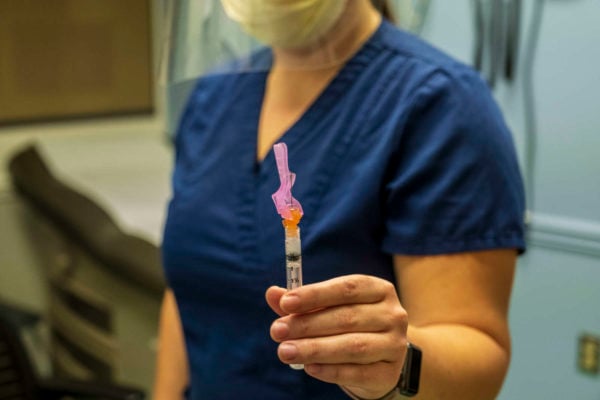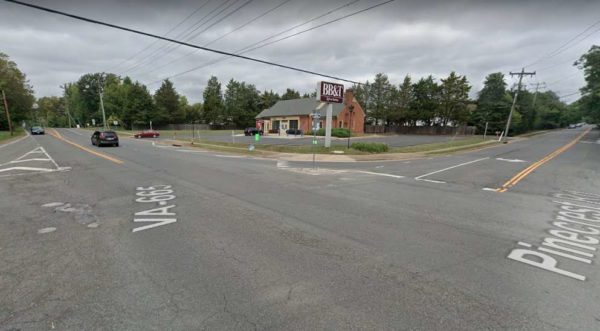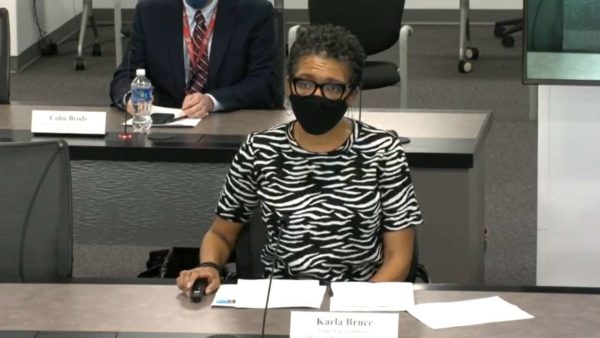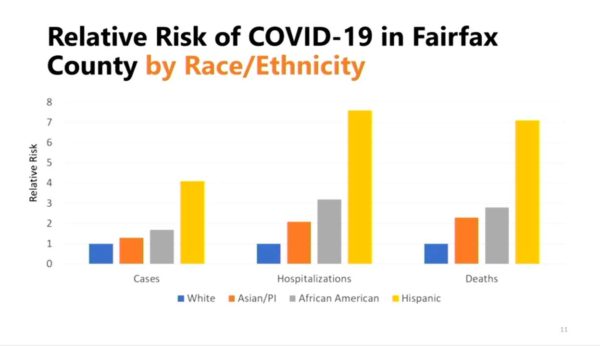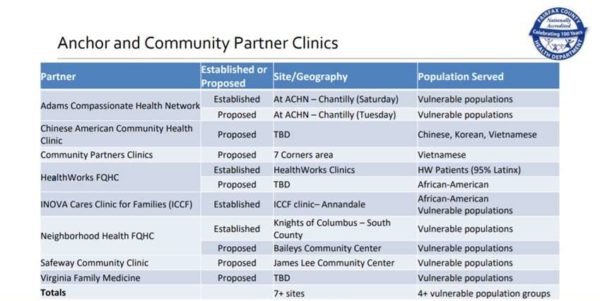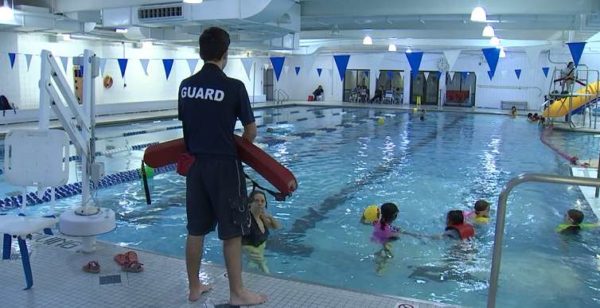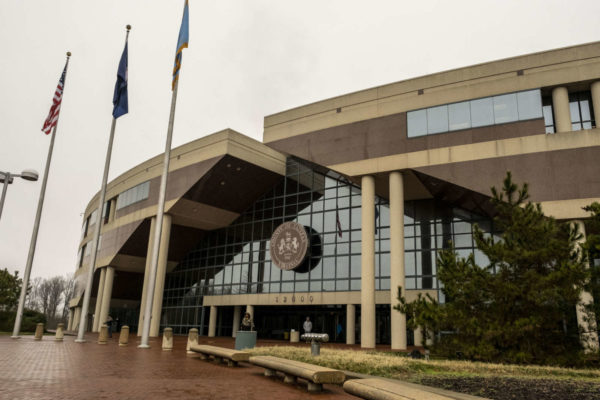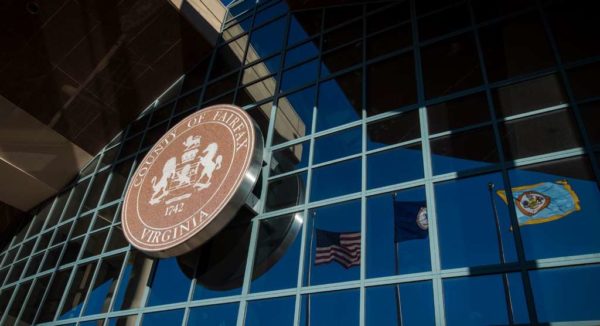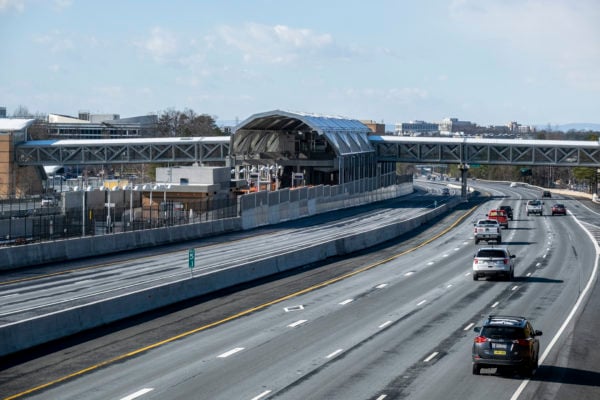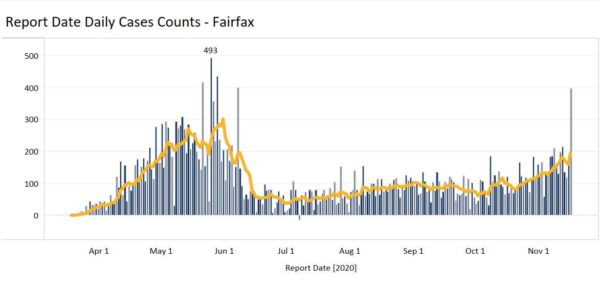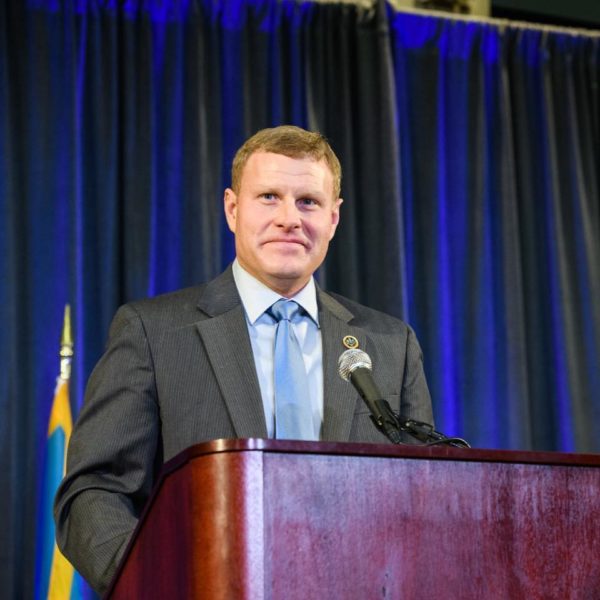(Updated at 11:05 am on 3/12/21) The Fairfax County Health Department decided to send their initial allotment of 3,800 doses of the Johnson & Johnson COVID-19 vaccine to local Inova hospitals, according to the Virginia Department of Health.
The county’s allotment comes from the Commonwealth’s current supply of 69,000 doses that it received from the federal government last week.
Fairfax County Health Department spokesperson Jeremy Lasich confirms this and tells Reston Now that the county sent its J&J vaccine doses to Inova, because the county currently only has the capacity to give out a certain amount of doses. As supply picks up, the county will rely more on partners like Inova.
The hospital system is planning to use this supply for a vaccination clinic for residents 75 and over, Lasich says.
Nearly 110,00 Fairfax County residents remain on the waitlist for a vaccine appointment, though the pace of vaccinations has been picking up, according to the county’s dashboard, which indicates that residents who registered on Jan. 22 are now able to make appointments.
The county did say they expect to receive a fresh supply of J&J vaccine doses by the end of March. It’s unknown at this time exactly how many doses, Lasich says.
Additionally, a number of pharmacies in Fairfax County received the J&J vaccine through the federal partnership program, the Virginia Department of Health confirms to Reston Now.
The health department for nearby Arlington County opted to allocate 1,500 doses of the J&J vaccine for a mass vaccination event this past weekend.
D.C. got doses of the J&J vaccine that were used at high-capacity vaccination sites last week. The city is also asking residents which of the three available vaccines they’d prefer when they pre-register. A city official said on Twitter that it’s for data collection to understand demand.
However, Fairfax County is not asking this question or providing a vaccine option because it is “primarily using Pfizer for first-dose appointments right now.”
Lasich says that this is a change from earlier in the year, when the county health department was primarily using Moderna. Exactly which vaccine is used depends on the amount of doses received, he notes.
There’s evidence that some prefer the Johnson & Johnson vaccine, which requires only one-shot, rather than the two shots needed for both Pfizer’s and Moderna. This potentially could simplify and quicken the pace of vaccination.
In addition to lowering the commitment from patients, the J&J vaccine is easier to store, and it appears that recipients have been less prone to severe side effects.
One potential drawback to the J&J vaccine is that trials have shown that it is less effective than the Pfizer and Moderna vaccines at preventing illness, though it still has an 85% efficacy against severe forms of COVID-19 and 100% efficacy against hospitalization and death from COVID-19.
Even though that means it still offers strong protection, health officials are putting a lot of effort in convincing people that the J&J vaccine is not the “inferior” vaccine.
VDH tells Reston Now that it expects the J&J vaccine to make up close to 20% of the state’s supply in April, increasing to about 30% in May.
In Fairfax County, conversations are ongoing about giving registrants the option to choose which vaccine they will receive, but it will all depend on supply availability.
“The best vaccine is the one available to you at the appointment,” says Lasich.
In Fairfax County, though, that isn’t yet the Johnson & Johnson vaccine.
Updated to further clarify that the initial allotment of J&J doses sent to the county are going to Inova hospitals, which is a partner of the county.
While residents wait for permanent improvements at a dangerous intersection in the Hunter Mill District a temporary traffic signal will be installed this summer.
A temporary traffic signal to the intersection of Fox Mill Road and Pinecrest Road will be operational by this summer, a Virginia Department of Transportation spokesperson confirmed to Reston Now. This traffic signal plus future permanent improvement plans will be discussed at a virtual public information meeting next week.
The planned changes include adding a permanent traffic signal and left-hand turn lanes.
In September, the Fairfax County Board of Supervisors approved the plan for the county’s transportation department to work with the VDOT on the implementation of the improvements.
The meeting takes place on March 15 but the public will have until March 25 to provide comments. The project’s aim is to relieve congestion and improve safety at the intersection, according to the release.
While temporary measures are being taken this summer, residents will still have nearly four years for all improvements to be completed. The intersection has long been a community concern, with hundreds signing petitions and signaling support in recent years for changes and improvements.
Construction is estimated to begin in the fall of 2024 and it is expected to take a year to complete – meaning fall 2025.
The improvements are estimated to cost $5.7 million and will be financed by the county.
From 2013 to 2019, 44 accidents occurred at the intersection with two being severe. 30 of the accidents caused property damage.
There are also congestion issues. The intersection averages about 15,500 vehicles a day, according to VDOT, with most being on Fox Mill Road. Long back-ups occur on Fox Mill Road during peak hours, notes a May 2020 presentation, due to vehicles waiting for a break in traffic to make a left turn.
The intersection is near a couple of pedestrian-friendly businesses, including a swim and tennis club and a church. It’s also relatively close to several schools.
Interim improvements have been made, though, including re-stripping and painting to provide turn lanes, installing a concrete island with a stop sign to create a yield, and removing foliage for better sightlines.
Beyond the proposed permanent fixes, the Fairfax County Comprehensive Plan also addresses safety and congestion issues on Fox Mill Road.
The plan calls for the widening of Fox Mill Road to four lanes from Reston Parkway to Monroe Street, constructing a sidewalk adjacent to northbound Fox Mill Road, and installing a bike lane.
Image via Google Maps
Hispanic residents of Fairfax County are seven times more likely to die from COVID-19 than their white, non-Hispanic counterparts when adjusted for variations in age, county data suggests.
Fairfax County Director of Epidemiology and Population Health Dr. Benjamin Schwartz reported that sobering trend to the Fairfax County Board of Supervisors during its health and human services committee meeting yesterday (Tuesday) as part of a broad overview of the county’s efforts to implement an equity-focused strategy to distribute COVID-19 vaccines.
Knowing that the pandemic has disproportionately affected communities of color, especially Black, indigenous, and Latino people, Fairfax County staff calculated the relative risk levels for infection, hospitalization, and death faced by different races and ethnicities, using white, non-Hispanic individuals as the control group.
According to the county, the results show that the risk of contracting COVID-19 is 1.8 times greater for Black people than for white people and four times greater for Latino or Hispanic people, who are also seven times more at risk of hospitalization.
In Fairfax County, Black people are being hospitalized at more than three times the rate of white people and are almost three times as likely to die from the disease.
Schwartz says the data focuses on community transmission, excluding long-term care facilities, and it has been adjusted for age, meaning it eliminates variances in age across different populations. It shows, for instance, that Latinos are more likely to die from or be hospitalized by COVID-19, even though the county’s Latino population is generally younger and older people are considered more at risk.
“This really highlights the social, economic, and medical risk factors pertaining to different groups in our county,” Schwartz said, mentioning large households, exposures through work, and underlying health conditions among the factors that have made some populations more vulnerable to COVID-19.
Fairfax County Chief Equity Officer Karla Bruce says the county is utilizing its COVID-19 Vulnerability Index as well as data showing the disease’s spread to identify areas that need a targeted approach for vaccine outreach and distribution, often because residents have limited access to medical care, transportation, and other public services.
“There are a lot of intersecting factors which are preventing people’s access to resources or access to the vaccine,” Bruce said. “So, we want to understand and look at how we might be better able to connect people to what will enable them to then connect to the vaccine.”
The county has been working with different community partners, including nonprofits and faith-based organizations, not only to counter vaccine hesitancy with education and trust-building, but also to identify people who are currently eligible to get vaccinated and register them for an appointment.
To improve the accessibility of the vaccine, the Fairfax County Health Department has been developing a network of community-based partner clinics that is expected to grow in the coming weeks, as seen in the slide below:
Schwartz says the Neighborhood Health federally qualified health center at the Bailey’s Community Center and the Safeway community clinic at the James Lee Community Center in Falls Church will start administering vaccinations this coming weekend.
The health department is also looking at sites in Lorton, Springfield, and Centreville, but the agreements are still being finalized.
“It will take a couple of weeks to have our clinics established, to confirm medical and non-medical staff for those clinics, and to get into a rhythm with the vaccinations,” Schwartz said. “But we are anticipating making substantial progress to reduce disparities in who receives vaccination in the county.”
Photo via Fairfax County, slides via Fairfax County Health Department (1, 2)
Eight Fairfax County Department of Public Works and Environmental Service infrastructure projects have received awards from the Mid-Atlantic Chapter of the American Public Works Association.
Five of those projects were named “project of the year” in their respective categories, including the renovations done at the Reston Community Center Aquatics Facility and the Innovation Center Metro Station parking garage in Herndon.
Three other projects were named as “honorable mentions.”
DPWES received more accolades from APWA than any other municipality in the Mid-Atlantic Chapter.
Renovations at RCC’s Aquatic Facility (Terry L. Smith Aquatics Center) were completed early last year. They included the installation of a new lap pool, warm water pool, zero entry pool with water features, mosaic artwork, updating ADA accessibility, and a new roof.
In total, the project cost about $5 million.
The work earned the department an award for “project of the year” for structures costing between $5 million and $25 million.
The parking garage at the Innovation Center Metro Station was also completed in the first quarter of 2020 and was a more expensive project.
Costing $52 million, the eight-level, 2,100 space parking garage was built with the intention of serving the Innovation Center Metro Station in Herndon. That station is part of Silver Line Phase 2 which is not yet operating due to delays.
The project actually came about 10% under budget despite the garage having problems with it “sinking” back in 2018.
It won “project of the year” for structures costing between $25 to $75 million.
Other Fairfax County projects to win awards include Scott’s Run Trail in McLean, a sewer emergency construction project at Backlick Run in Springfield, and Tertiary filter rehabilitation project at the pollution control plant in Lorton.
Photo courtesy of Fairfax County
Fairfax County employees are now prohibited from providing information about a person’s immigration or citizenship status to federal immigration authorities unless required by law or court order.
The Fairfax County Board of Supervisors voted 9-1 to adopt the new Public Trust and Confidentiality Policy yesterday (Tuesday) as part of a board matter introduced by Chairman Jeff McKay, Dranesville District Supervisor John Foust, and Providence District Supervisor Dalia Palchik.
While Fairfax County has long maintained that it does not assist Immigration and Customs Enforcement (ICE) unless mandated, McKay, Foust, and Palchik say the need to turn those guidelines into a formal policy has been heightened the COVID-19 pandemic, which has disproportionately affected local Latino communities in particular.
“While there are no known instances of General County employees voluntarily sharing information about a resident’s immigration status, such policies are no doubt critical steps forward in building community trust and transparency,” the board matter said. “They also help quell fear in our community and ensure everyone feels comfortable getting the assistance they need from local government.”
The immigrant rights groups ACLU People Power Fairfax and CASA hailed the trust policy as “a major victory” after a four-year campaign urging Fairfax County to bar agencies from voluntarily disclosing information to ICE.
Advocates have argued that information-sharing with ICE can undermine public safety, as fear of detention or deportation discourages immigrants from reporting crimes, seeking medical attention, going to school, accessing basic needs assistance, and utilizing other critical local government services.
CASA says Fairfax County’s new policy is the first of its kind in Virginia.
“For four years, we have marched, spoken out and stood up for our rights as immigrants, and now we can finally breathe easier,” Luis Aguilar, CASA’s Virginia state director, said. “We are grateful for the leadership of Chairman McKay and Fairfax County Board of Supervisors, who stood strongly in support of immigrant families by voting through this critical county policy change.”
The Board of Supervisors directed staff to draft the new policy last year. McKay credits ACLU People Power Fairfax and CASA with helping develop the policy.
According to the board matter, the trust policy is intended to complement a Fairfax County Police Department general order that established more robust guidelines regarding the FCPD’s role in civil immigration cases and interactions with immigrants.
Implemented on May 6, the general order expanded on an existing directive that instructed officers against taking individuals into custody or reporting them to ICE solely on the basis of an outstanding civil administrative warrant.
Under the new trust policy, Fairfax County employees are now prohibited from:
- Disclosing personal identifying information about individuals, such as their citizenship or immigration status, unless required by law or the individual has given their permission
- Providing access to county facilities, records, or funds not accessible to the public unless mandated by law, court order, or a criminal warrant
- Using county resources to provide information to federal immigration enforcement officials
- Threatening, coercing, or intimidating individuals based on their actual or perceived citizenship or immigration status
- Participating in civil immigration enforcement operations
The policy also directs county agencies to accept driver’s licenses, passports, and other photo documents issued by a state or foreign government or an approved nonprofit as sufficient to verify an individual’s identity or address.
“The Trust Policy breaks new ground in Virginia by prohibiting voluntary cooperation with ICE,” ACLU People Power Fairfax Lead Advocate Diane Burkley Alejandro said. “…ICE has exploited the weaknesses of Virginia privacy laws to obtain contact information to track down its ‘targets.’ Thanks to Chairman McKay and the Board, Fairfax now has guardrails in place to prevent this happening here.”
Staff photo by Jay Westcott

Hotel rooms have suddenly become difficult to come by in Fairfax County ahead of Inauguration Day on Wednesday.
That is a welcome problem for the lodging sector of the hospitality industry, which has been in a downward spiral since the COVID-19 pandemic prompted a slew of travel restrictions and stay-at-home health guidance.
But this inauguration will be unlike any other in recent political history. The general public’s ability to attend President-elect Joe Biden and Vice President-elect Kamala Harris’s Oath of Office ceremony has been sharply curtailed due to the pandemic, but hotels are hosting another large group of guests: the National Guard.
Up to 21,000 members of the National Guard have been authorized to come to D.C. and secure the city ahead of potential attacks, after Trump supporters stormed Capitol Hill on Jan. 6. Fairfax County hotels are reportedly housing some of the 15,000 guard members already in the D.C. metropolitan area.
“We are indeed hearing anecdotally from hoteliers that there has been an uptick in reservations compared with the past 11 months, but we are unable to ascertain whether those reservations are directly related to the inauguration and/or the National Guard or people who are visiting for leisure or business travel,” Visit Fairfax President and CEO Barry Biggar said in a statement.
The pandemic and ensuing shutdowns devastated the hospitality industry across the U.S. In Virginia, COVID-19 has resulted in the loss of about 100,000 jobs, according to the American Hotel and Lodging Association.
In November, the AHLA found that 71% of its member hotels said “they won’t make it another six months without further federal assistance given current and projected travel demand.” 47% of respondents said they would be forced to close hotels.
Many hotels were forced to layoff more staff this winter, even as access to the second round of the Paycheck Protection Program has expanded to all lenders.
But the employees who remain taking the sudden surge of guests in stride, Biggar explains.
“What we do know is that our hotels have been working tirelessly, even with staff shortages and for long hours, to ensure that our guests are treated with the utmost hospitality,” he said.
Photo courtesy Sheraton Reston
Fairfax County will receive an additional $34 million to provide emergency rental assistance to residents experiencing economic challenges due to the COVID-19 pandemic.
During a budget policy committee meeting yesterday (Tuesday), Fairfax County Department of Management and Budget Director Christina Jackson told the county board of supervisors that the department has submitted a certification for the award, and the amount is expected to be confirmed today.
The money comes from a $25 billion emergency rental assistance program that the U.S. Treasury Department established using funds from the COVID-19 relief package that Congress passed at the end of December.
“This will be huge,” Fairfax County Board of Supervisors Chairman Jeff McKay said. “I know we feel good about it, but obviously, there are a lot of folks out there struggling, and this will be a great opportunity to help those folks.”
Under the treasury program, renters may be eligible to receive assistance if at least one or more people in their household has experienced financial hardship due to the pandemic, are at risk of experiencing homelessness or housing instability, or have a household income at or below 80% of the area median income.
Applicants can receive up to 12 months of assistance, with the possibility of an additional three months if needed to ensure housing stability and funds are still available.
The treasury is allocating the funds directly to states and local governments with more than 200,000 residents.
Jackson says the treasury is required to disperse all of the program funds by the end of January, so the county should have “dollars in hand” by the end of the month.
“We’re working with staff to try to incorporate this funding with other awards that we’ve received to make sure we’re using all the resources to our advantage,” Jackson said.
Because of the incoming grant, the Fairfax County Department of Management and Budget is recommending that the county increase its COVID-19 grants reserve by $50 million as part of its Fiscal Year 2021 mid-year budget review.
To offset anticipated revenue losses, the county plans to take $9.1 million out of a general fund reserve that the board of supervisors set up in May to support its coronavirus response efforts.
If the adjustment is approved, the COVID-19 reserve will have $16 million remaining, including roughly $12 million that the county mostly plans to use for Federal Emergency Management Agency reimbursements.
As part of the mid-year review, Fairfax County staff are also recommending that the county create 13 new positions in the health department to boost its pandemic response, especially when it comes to the COVID-19 vaccination program. The positions would be initially covered by federal stimulus funds.
“We’re in constant contact with the health department relative to the continuous pivoting in response to COVID,” Fairfax County Chief Financial Officer Joe Mondoro said. “There are a number of other activities that they’re undertaking to respond to…whether that’s the need for additional contact tracers, whether that’s the escalation of the vaccination requirements.”
The board of supervisors will hold a public hearing and take action on the FY 2021 budget mid-year review when it meets on Jan. 26.
Photo via Fairfax County government/Facebook
At a virtual town hall on Wednesday night (Jan 6), Fairfax County Health Department Director Gloria Addo-Ayensu answered a number of questions about COVID-19 vaccine distribution.
Most of the inquiries revolved around the timeline of the different phases and when certain groupings of people will be eligible to get the vaccine.
Right now, the county – like other neighboring localities – remains in phase 1a of distribution, meaning that frontline healthcare workers and residents of long-term care facilities are the only ones currently eligible. This covers about 75,000 county residents in total.
In total, so far, Addo-Ayensu says that about half of those eligible in the county have been vaccinated so far.
Vaccinations are being done by the health department, Reston Hospital Center, INOVA hospitals, and at the long-term care facilities in partnership with CVS and Walgreen pharmacies.
But there have been challenges already in getting the vaccine.
For those not affiliated with a hospital, getting a vaccine requires making an appointment with the county by calling the health department. But residents have described being on hold for hours.
“We have a call system that’s been completely overwhelmed, people weren’t just getting through,” said Addo-Ayensu. “That’s just very unfortunate… We really do apologize for that inconvenience.”
She said that the county is working to fix this and starting on Monday (Jan 11), there’ll be an online system in place where folks can go to start the process of booking an appointment.
These complications are not unique to Fairfax County.
At a press conference on Wednesday (Jan 6), Virginia Governor Ralph Northam acknowledged that the state could be going faster in administering vaccines.
It’s unclear at this moment when, says Addo-Ayensu, when the county will move to phase 1b, which includes residents over the age of 75 and frontline essential workers.
“I don’t have an exact date of 1b, but I can say it’s going to happen very soon,” said Addo-Ayensu. “We haven’t gotten the green light to start vaccinating phase 1b just yet.”
When that does happen, though, it will be a very large effort.
More than 1.2 million Virginia residents are theoretically eligible for the vaccine in phase 1b, Addo-Ayensu said. Fairfax County is about 1/7th the population of the commonwealth, so quick math shows that about 171, 500 county residents could be eligible for the COVID-19 vaccine in phase 1b.
Then, there’s 1c which includes residents over 65, those with high-risk medical conditions, and remaining essential workers.
As for a timeline, it all depends on vaccine supply – which is being filtered down from the federal government to the state to the county.
“If we have sufficient vaccine… we could be going through 1a and 1b [in] March. And in spring, looking to do 1c and moving into the summer, doing the general public.”
Another important note is that, at this point, children are not being vaccinated due to the lack of data and studies.
Overall, Addo-Ayensu admits it’s going to be a challenge to provide all 1.17 million Fairfax County residents a COVID-19 vaccine as quickly as possible.
“That’s quite a heavy lift,” she said.
Tomorrow is Thanksgiving, and with that brings closures around the county. Let’s take a look at what’s open, and what’s closed.
All Fairfax County Government offices will be closed on Nov. 26 and 27 for the holiday.
The Fairfax Connector will be operating on a Sunday service on Thursday, and a holiday weekday service on Friday.
Fairfax County Public Schools provided seven-day meal kits for Thanksgiving week, which were available for pickup through Nov. 24.
In Herndon, all trash collection is halted for the holiday, and all trash usually collected Thursday will be collected today.
Reston Community Center in Hunters Woods will be open from 9 a.m. until 2 p.m. on Thanksgiving, and from 9 a.m. until 9 p.m. the day after. However, RCC Lake Anne will be closed both days.
All Fairfax County parks will be closed on Thanksgiving, but all RECenters are open until noon. The day after Thanksgiving, the RECenters will be running normal hours and Frying Pan Farm Park will open its farm and indoor area.
Photo by Shoeib Abolhassani/Unsplash
The Dulles Regional Chamber of Commerce listened to comments about meeting the demand for workforce housing in Fairfax and Loudoun counties during its Metro Monday meeting yesterday afternoon.
The chamber hosted a panel made up of regional professionals who explained the difficulties that exist and the points that must be reached to meet the growing demand for housing.
The panelists explained that this is not a situation that affects just one group or income level, but is a widespread issue.
“I think the main thing to consider is that there’s affordability needs across all income levels,” Alex Koma, a reporter for the Washington Business Journal, told the chamber. “There is no income level, right now, that we’re not seeing renters’ cost burdened at this point.”
In addition to meeting the general housing need, Koma also discussed the challenges of coping with the COVID-19 pandemic as it affects Fairfax and Loudoun counties. He detailed that Fairfax has been forced to walk back tax increases while Loudoun has put a hold on portions of its spending.
“Localities are proceeding very cautiously. That goes as well for the state,” Koma said. “They have left some money for the Virginia Housing Trust Fund in the budget for this coming year, but in future fiscal years a lot of that progress has been undone.”
Graham Owen, the senior planner for the Department of Planning and Development in Fairfax County, echoed Koma’s sentiments regarding COVID-19’s effect, but stated “affordable housing does remain a top priority for the Board of Supervisors in Fairfax.” However, Owen did raise several other challenges that the county must address for affordable housing for all residents.
The county projects it will add more than 62,000 households in the next 15 years which includes a need for 15,000 new homes for families at 60% and below of the area median income (AMI), according to Owen. Owen added that challenges for the county include almost 71,000 households earning $50,000 or less, and rising rent and stagnant income pushing the county’s housing market out of reach for low to moderate income households.
Abdi Hamud, the Affordable and Workforce Housing Program Administrator in Fairfax County’s Department of Housing and Community Development, described the county’s efforts to address affordable housing with the Communitywide Housing Strategic Plan that was adopted by the Board of Directors in 2018. The plan calls for a need of 5,588 housing units for households that make between 50 and 80% of the AMI, 9,048 units for those between 80 and 100% AMI, and 11,929 units for those between 100 and 120% AMI.
The plan seeks to employ the Land Use Policy and public-private partnerships to address the housing needs over 15 years.
Kim Hart, a developer of affordable workforce housing who works with the non-profit Windy Hill Foundation and is a general partner of for-profit Good Works LP, presented further challenges from the development aspect and suggestions for policies he would like to be supported.
Hart explained the budgetary concerns for building affordable housing by pointing to steady prices in building materials as opposed to the variable cost of land that can affect unit pricing.
“Nobody sells me a 2×4 for less or a yard of concrete for less,” Hart said.
“If I’m going to rent a unit below market rate, especially down as low as 60% of AMI, or 50, or 40, or even to 30% of AMI, I have to save money on land and I have to save the cost of money.”
Hart also presented federal and state policies that affect the ability to build affordable housing.
At the federal level, Hart urged the chamber to support pending legislation to increase federal funding for low-income housing tax credits (LIHTC) which he said, “without it, we would have very little affordable housing.”
He also supported increasing funding and targeting those most in need, and to continue supporting the Community Reinvestment Act to allow banks to invest in LIHTC that will in turn support affordable housing.
For the state level, Hart commended Virginia Housing for “running a great program,” but urged pushing for more funds from the federal level for it. He also urged for support of House Joint Resolution 2 to amend Section 6, Article X of Virginia’s constitution. The passage of this resolution would allow for property tax exemption for affordable housing, according to Hart.
Hart’s analysis repeated a statement from Koma wherein he pointed at money for affordable housing being cut from budgets resulting in delaying or cancelling projects due to the high cost of materials and labor.
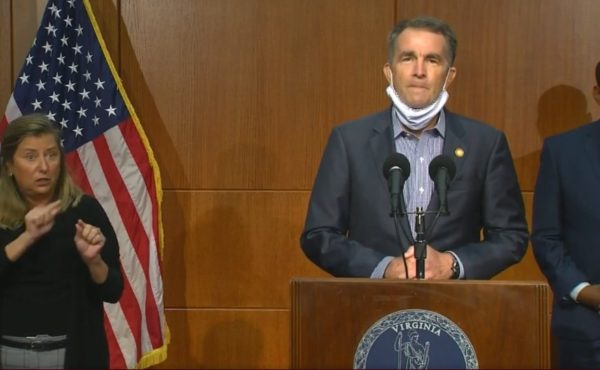
Fairfax County recorded a massive jump of 400 COVID-19 cases today (Monday), up from 174 yesterday, due to a backlog in data reporting on the part of the Virginia Department of Health.
The Fairfax Health District added 1,366 cases over the past week for a seven-day average of 195.1 cases, the highest rate since the district saw an average of 197.7 cases over seven days on June 8.
Fairfax County also reported three deaths from COVID-19 over the past week, raising the county’s death toll to 625 people. The county has now reported 27,095 total cases, and 2,440 people have been hospitalized since the Fairfax Health District identified its first presumptive positive case in early March.
The Fairfax Health District currently has a total testing positivity rate of 8.3% out of 392,064 testing encounters, according to the VDH.
Because of the data reporting backlog, the 2,677 cases that the VDH reported today statewide are the most that Virginia has recorded in a single day at any point during the pandemic.
While Virginia’s COVID-19 infection rate remains one of the lowest in the U.S., the clear upward trend in cases that the state has seen over the past 90 days led Gov. Ralph Northam to tighten restrictions on social gatherings and businesses in an effort to mitigate the spread of the novel coronavirus.
“While cases are not rising in Virginia as rapidly as in some other states, I do not intend to wait until they are,” Northam said when announcing the new measures on Nov. 13. “We are acting now to prevent this health crisis from getting worse.”
Effective as of midnight on Sunday (Nov. 15), the cap on public and private in-person gatherings has dropped from 250 people to 25. The revised executive order defines gatherings as indoor and outdoor parties, celebrations, and other social events, but the limit does not apply to educational settings.
Religious services can also have more than 25 people in attendance if they adhere to health and social distancing protocols, including having at least six feet of separation between individuals and practicing routine cleaning and disinfection of frequently-contacted surfaces.
A mask mandate requiring all individuals 10 and older to wear face coverings in indoor public settings that has been in place since May 29 has been expanded to include all individuals aged 5 and over.
Northam has also prohibited the on-site sale, consumption, and possession of alcohol after 10 p.m. in any restaurant, bar, or other food and beverage service establishment.
Finally, violations of social distancing, mask-wearing, and cleaning guidelines by essential retail businesses, including grocery stores and pharmacies, are now punishable by the state health department as Class One misdemeanors.
Photo via Governor of Virginia/Facebook, Virginia Department of Health
Jeffery McKay, the Chairman of the Fairfax County Board of Supervisors, was elected to serve as the 2021 President of the Virginia Association of Counties (VACo) yesterday.
The statewide group advocates with the state’s legislature for the interests of the Commonwealth’s 95 counties, according to a press release from McKay.
“I’m honored to serve as the next President of the Virginia Association of Counties. Throughout my many years with VACo, I have always considered us to be a large family,” said McKay in a speech delivered to members.
Chairman McKay had led efforts with VACo over the last several years to drastically increase state education funding, transportation funding and ensure the perspective of counties is heard statewide, according to the press release.
“I treasure the many relationships I have built with my colleagues throughout Virginia. VACo is a great way to bring us all together to advance our communities,” said McKay.
This upcoming year, Chairman McKay wants to lead VACo with the same level of equity as that of Fairfax County.
“As a kid riding my bike with friends, I didn’t realize what this meant, but I saw firsthand that where you come from was an important factor for your future success and livelihood. When I got older, I understood that this was wrong,” McKay said.
“This was a driving force behind my decision to begin a career in local government and an inspiration behind the One Fairfax equity policy that I introduced in 2017. This policy has become central to all decision making in Fairfax County by requiring us to look at all policies.”
McKay started his tenure yesterday.
Photo via Jeff McKay/Facebook

A new program for planning and designing public spaces is coming to Reston Historic Trust & Museum later this month.
The museum announced the program, Placemaking in Fairfax County, in a press release yesterday morning (Nov. 9). The discussion about the upcoming program is planned to take place next Wednesday (Nov. 18) at Reston Community Center Lake Anne (1609-A Washington Plaza).
According to the press release, the program presented by Deputy County Executive of Fairfax County Anne Rachel Flynn will emphasize:
- The importance of “placemaking”
- Planning and designing public spaces in the community
- Creating great neighborhoods and community centers
Fairfax County residents can register online to attend this program next week with Reston Community Center, using the registration code “702000-1B,” the press release said, or by calling the center at 703-476-4500.
To be a part of the discussion virtually, participants should email [email protected].
Photo via Reston Historic Trust & Museum
Tomorrow is Veteran’s Day, and the holiday means it’s time to take a look at which community sites will be open, and which will be closed.
All Fairfax County government offices will be closed. Libraries and courts will be closed as well.
The Fairfax Connector will be operating on its Holiday Weekday Service, with several routes altered.
Fairfax County Public Schools will hold an all-virtual, two hour early release day for all students.
All parks will be closed with the exception of Frying Pam Park, which will be open from 9 a.m. until 5 p.m.
RECenters will be open, offering free service to all veterans for the day. Due to COVID-19, reservations will be required.
Reston Community Centers will be open and operating under normal hours. However, the Fairfax County Neighborhood and Community Services community centers will be closed.
Photo by Aaron Burden/Unsplash

In anticipation of the upcoming holiday season, Fairfax County Emergency Information released a list of guidelines with information on how to celebrate Thanksgiving safely.
The county emphasized it’s still vital to work to slow the spread of COVID-19. Despite the cold months and inevitable pandemic fatigue, community members can’t let their guards down now, health officials say.
The county’s seven-day average of cases is creeping up. On Nov. 2, the weekly case count was the highest since mid-June when an average of 137 cases was recorded on June 12. Now, that number has increased to nearly 134 weekly cases.
According to the guidelines, high-risk activities include:
- Going shopping in crowded stores just before, on, or after Thanksgiving,
- Participating in or spectating a crowded race.
- Attending crowded parades.
- Attending large indoor gatherings with people from outside your household.
Moderate-risk activities include:
- Having a small outdoor dinner with family and friends in your community.
- Visiting pumpkin patches or orchids where people use hand sanitizer before touching produce, wearing masks is encouraged or enforced and people can maintain social distancing.
- Attending small outdoor sports events with safety precautions in place.
Lower risk activities include:
- Having a small dinner with people who live in your household.
- Having virtual dinner and sharing recipes with friends and family.
- Preparing recipes for family and neighbors and delivering them in a way that doesn’t involve contact with others.
- Shopping online the day after Thanksgiving, as opposed to in-person.
- Watching sports events, parades, and movies from home.
The county also advises not participating in in-person activities if you or anyone in your household has or are showing symptoms of COVID-19. They advise following the CDC’s recommendations on holiday gatherings to further lower risk. Traveling increases the chance of getting and spreading COVID-19.
Photo via Unsplash


